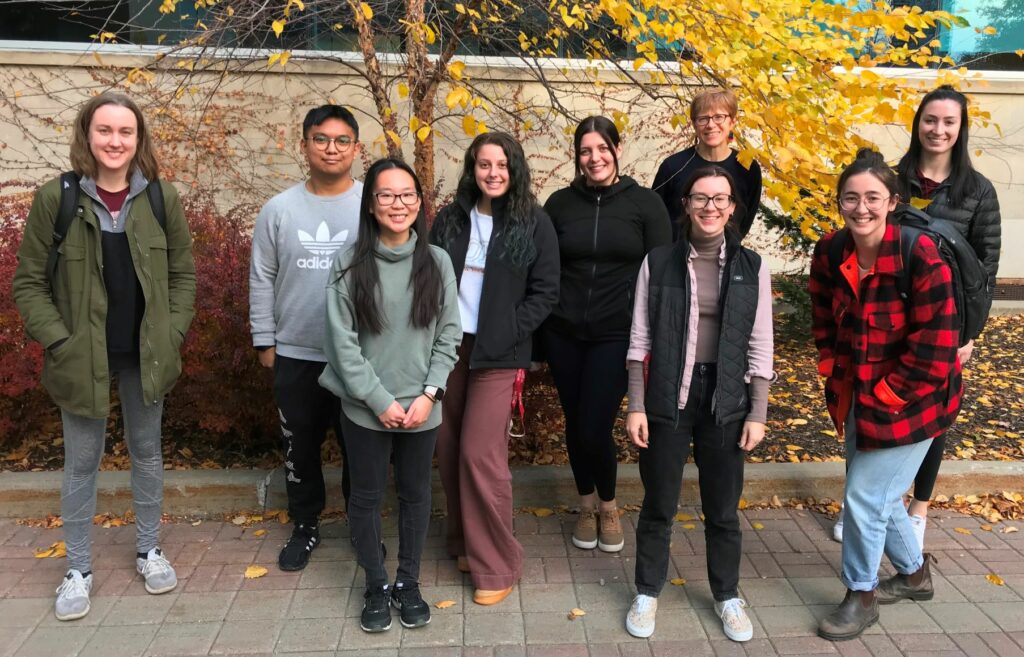My lab uses a range of physiological, biochemical and molecular approaches to address research questions under two broad themes.
First, we use the formation of dominance hierarchies in fish and the resultant social stress as a means of studying chronic stress. Much of this work focuses on salmonid fish, which readily form social hierarchies in the lab. Typically, hierarchies are formed through aggressive interactions, with dominant fish monopolizing resources that are essential but limited, such as food or shelter. Subordinate fish are excluded from these key resources and are subjected to agonistic attacks by dominant fish, resulting in chronic stress and prolonged elevation of the glucocorticoid stress hormone cortisol. Our research questions focus on how the stress axis functions during acute versus chronic stress, as well as the physiological consequences of chronic stress on metabolism, growth and tolerance of environmental challenges such as elevated temperature.
Second, we aim to understand the mechanisms through which fish maintain gas exchange and acid-base balance in diverse environments. Work in this area focuses on mechanisms of gas sensing and ion transport, particularly with respect to the enzyme carbonic anhydrase, which plays key roles in both gas transfer and acid-base balance in a variety of tissues. Recently we used CRISPR/Cas9 to develop a zebrafish line lacking functional expression of a cytosolic CA isoform, CA17a, and we are using these fish to probe the role of CA17a in ionic regulation and gas sensing. We are also investigating the dual roles of cortisol as a stress hormone and an ionoregulatory hormone during early development, again using zebrafish.
Publications – Google Scholar
People in the lab

Brittany Bard (PhD student; NSERC, FRQNT) – Chronic stress, cortisol and thermal tolerance
Carol Best (PhD student; NSERC, OGS) – Regulation of the stress axis during chronic social stress
Michelle Hong (MSc student) – Ionic regulation in zebrafish lacking functional expression of corticosteroid receptors
Brenna Wilson (MSc student) – Stress and growth in Polypterus senegalus, a basal ray-finned fish
From left to right, Carol Best (PhD student), Michael Tea (honours project student), Michelle Hong (MSc student), Lissandra Tuzi (honours project student), Jordyn Kiteley (honours project student), Kaitlyn Flear (honours project student), Katie Gilmour (behind Kaitlyn), Brittany Bard (PhD student), and Brenna Wilson (MSc student).
Teaching
BIO 2135 Animal Form & Function
Lectures on main animal groups, their life cycles, development, body plan, functional organisation including metabolism and their adaptation to different environments.
Lecture, Laboratory
BIO 3302 Animal Physiology II
Regulatory systems in animals. Physiological adjustments to environmental changes. Thermoregulation, osmoregulation and excretion, acid-base balance, respiration and circulation.
Lecture
Opportunities and contact information
Opportunities are available for graduate study at either the MSc or PhD level. In addition, my lab group typically includes undergraduate students carrying out honours research projects, UROP projects or NSERC USRA projects. Prospective graduate or undergraduate students are invited to contact me to discuss possibilities:
kgilmour@uottawa.ca
Office 204 D’Iorio Hall
Department of Biology, 30 Marie Curie, Ottawa, ON, K1N 6N5, Canada
Phone 613-562-5800 x6004